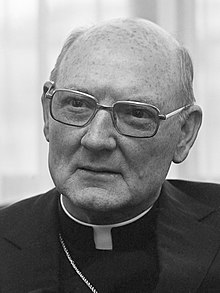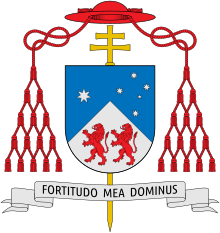Edward Idris Cassidy
Edward Idris Cardinal Cassidy (born July 5, 1924 in Sydney , Australia ) is a Cardinal Emeritus of the Roman Catholic Church .
Life
Cassidy's parents divorced when he was one year old, after which he grew up with his maternal grandparents. His grandmother, Mary Cassidy, initiated his baptism in secret. He received on 23 July 1949 by Norman Thomas Cardinal Gilroy , the ordination of the Australian diocese of Wagga Wagga , after he was previously advised of his lack of Catholic teaching and of his family background of a spiritual career. His parents then converted to the Catholic faith, and in 2009 he wrote that he could only develop a relationship with his mother after his ordination.
In August 1955 he became an attaché of the internistiature in India. Pope Paul VI awarded him on June 21, 1963 the honorary title of redundant secret chamberlain of His Holiness ( Monsignor ) and appointed him on October 27, 1970 titular Archbishop of Amantia . He was ordained bishop by Cardinal Secretary of State Jean-Marie Villot on November 15 of the same year, co-consecrators were Archbishop Giovanni Benelli , substitute for the Vatican State Secretariat , and Matthew Beovich , Archbishop of Adelaide . Cassidy then served as Apostolic Pro-Nuncio in Taiwan . After further stints in Bangladesh , South Africa and the Netherlands , Cassidy was appointed as a substitute in the Vatican State Secretariat in 1988 and was appointed President of the Pontifical Council for Christian Unity a year later .
During the consistory on June 28, 1991, Pope John Paul II accepted him as a cardinal deacon with the title deaconry Santa Maria in Via Lata in the college of cardinals .
During his tenure as President of the Unity Council, Cassidy drove forward a large number of projects aimed at promoting understanding between religions and denominations. On March 16, 1998 , a declaration on the Shoah , drawn up under his leadership and signed by John Paul II , was presented in the Vatican , which was seen as an essential milestone in the Christian-Jewish dialogue. Another highlight of his work was the signing of the joint declaration on the doctrine of justification by representatives of the Roman Catholic Church and the Lutheran World Federation on October 31, 1999 in Augsburg .
In addition, he promoted rapprochement and reconciliation between the Catholic and Orthodox Churches . On March 3, 2001, due to his age, Cassidy resigned from his leadership position in the Pontifical Unity Council and returned home to Australia . On February 26, 2002 he was elevated to cardinal priest pro hac vice while retaining his titular church .
Cardinal Cassidy is now a chaplain in the village of Warabrook , New South Wales .
literature
- Edward Cardinal Cassidy , in: Internationales Biographisches Archiv 16/1999 of April 12, 1999, in the Munzinger Archive ( beginning of article freely available)
Web links
- Cassidy, Edward Idris. In: Salvador Miranda : The Cardinals of the Holy Roman Church. ( Florida International University website), accessed October 28, 2016.
- Entry on Edward Idris Cassidy on catholic-hierarchy.org ; Retrieved October 26, 2016.
- Biography of Cardinal Edward Idris Cassidy
Individual evidence
- ↑ Jordan Grantham: EXCLUSIVE: Cardinal Cassidy interview - 'Friends in high places'. catholicoutlook.com, October 23, 2017, accessed December 8, 2019 .
- ↑ Annuario Pontificio per l'anno 1964 , Città del Vaticano 1964, p. 1241.
- ^ Rinuncia del Presidente del Pontificio Consiglio per la Promozione dell'Unità dei Cristiani e Nomina del Successore. In: Daily Bulletin. Holy See Press Office , March 3, 2001, accessed February 13, 2016 (Italian).
| predecessor | Office | successor |
|---|---|---|
| Luigi Accogli |
Apostolic Pro-Nuncio in China 1970–1979 |
vacant |
| ? |
Apostolic Pro-Nuncio in Bangladesh 1973–1979 |
Luigi Accogli |
| Alfredo Poledrini |
Apostolic Pro-Nuncio in Lesotho 1979–1984 |
Joseph Mees |
| Alfredo Poledrini |
Apostolic Delegate in South Africa 1979–1984 |
Joseph Mees |
| Bruno Wüstenberg |
Apostolic Pro-Nuncio in the Netherlands 1984–1988 |
Audrys Juozas Bačkis |
| Eduardo Martínez Somalo |
Substitute at the Vatican State Secretariat 1988–1989 |
Giovanni Battista Re |
| Johannes Cardinal Willebrands |
President of the Pontifical Council for Promoting Christian Unity 1989–2001 |
Walter Cardinal Kasper |
| personal data | |
|---|---|
| SURNAME | Cassidy, Edward Idris |
| ALTERNATIVE NAMES | Cassidy, Edward Idris Cardinal (full name) |
| BRIEF DESCRIPTION | Australian clergyman, cardinal |
| DATE OF BIRTH | July 5, 1924 |
| PLACE OF BIRTH | Sydney , Australia |

